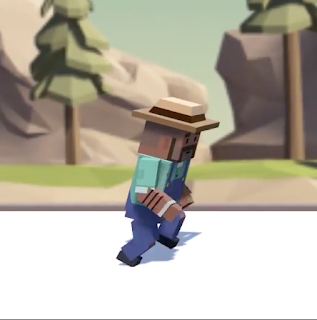Games MDA
For this weeks task we had to do readings on game design MDA. MDA stands for mechanic dynamic aesthetic. The first article I read was called MDA: A Formal Approach To Game Design And Game Research. The article talked about how games are designed by designers and teams of developers and they are consumed by players and how players purchase them use them and eventually cast them away like consumable goods. The article also talked about how games are different to other entertainment products such as movies. TV and books because their consumption is unpredictable. While we known what happens at the end of a TV show, a book and a movie when it is finished we don't know what happens at the end of a game when it is finished. The mechanics are the particular components of the game, the dynamics are the run-time behaviour of the mechanics acting on player inputs and each others outputs over time and the aesthetics are the desirable emotional responses evoked in the player when they interact with the game system. The article also talked about what makes a game fun. This is what the aesthetics are. The types of aesthetics are sensation: game as sense pleasure, fantasy: game as make believe, narrative: game as drama, challenge: game as obstacle course, fellowship: game as social framework, discovery: game as uncharted territory, expression: game as self-discovery, submission: game as pastime. The games Quake, Charades, The Sims and Final Fantasy were used as examples of games that follow these aesthetics. Charades uses fellowship, expression and challenge, Quake uses challenge, sensation, competition and fantasy, The Sims uses discovery, fantasy, expression and narrative and Final Fantasy uses fantasy, narrative, expression, discovery, challenge and submission. The second article was called Design, Dynamics, Experience (DDE): An Advancement Of the MDA framework for game design. This article talks about how while MDA is the most widely accepted approach to game design it has been criticised for several weaknesses. Multiple game design frameworks have been proposed to replace MDA however none of them worked so they tried improving elements of MDA which is how DDE was formed. The article talks about the differences between MDA and DDE and design subcategories. The design subcategories are blueprint, mechanics and interface. Blueprints deal with the game world in concept, its cultures, religions, physics, other rule sets, the free form notation of the game mechanics and the developed styles of art design, narrative design, character design and sound design that together create the aesthetical experience. Mechanics deal with the coding of the game and the game rules. Interface deals with the design and production elements of creating the game and everything that serves to communicate the game world to the player, how it looks, how it sounds, how it reacts and interacts with the player and the games internal feedback loops. Finally we watched a video called "Explaining The MDA Design Framework". The video discusses how to break a game down into those three assets and the basic rules and algorithms of a game. It also tells us that the mechanics of a game are running, jumping, looking down etc. The video uses the video game Stalker as an example. It talks about how in the game when you fire your gun the bullet may bounce around or your gun might jam which is a mechanic that the player cannot control. The video also defines dynamics as the emergent behaviour that arises from gameplay, when the mechanics are put into use. It also talks about how with mechanics and dynamics in a game like Monopoly you can move around and also acquire pieces and you can also get money and spend it. The video also talks about sensation which is the emotion of the player, fantasy which is about how a player can achieve their fantasy which is the game goal, narrative which is the games story and the player figuring out how it ends, fellowship which is players being able to accomplish tasks together, discovery which is allowing the players to wonder, expression which is to use tools to create whatever you want and submission which is putting in work that will give you a satisfying result in the end.




Comments
Post a Comment